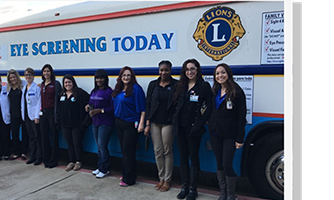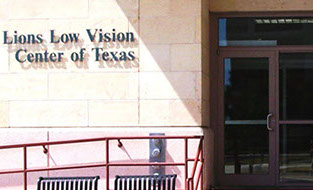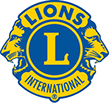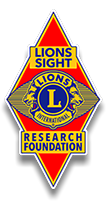DISTRICT 2-A2
LIONS SIGHT RESEARCH FOUNDATION
LIONS of DISTRICT 2-A2
DISTRICT 2-A2 LIONS SIGHT RESEARCH FOUNDATION
Looking Back
Moving Forward
All Lions throughout the world are committed to serving others as their motto, “We Serve” explains. Because the Founders of the International Association took on the challenge laid before them in 1925 by Hellen Keller to become “Knights of the Blind”, Lions have always had their primary cause as that of helping the blind and visually impaired. Lions and their Clubs serve the visually impaired in many, many ways. We in District 2-A2 collect used eyeglasses and recycle them to be given to the people that need them in other countries by Lions in those countries. We provide Guide Dogs to the blind and offer life skills and occupational training. We support facilities dedicated to hiring the visually impaired such as the San Antonio Lighthouse for the blind which was begun, in large part, through the efforts of the San Antonio Founder Lions Club in the 1930’s. And we are always prepared to help in the case where eye exams, or even surgery is needed. But the most dynamic way that Lions of District 2-A2 carry out the mission to help the visually impaired is through their Lions Sight Research Foundation, which is dedicated to supporting research into diseases which impair vision or even cause blindness. And to complement that work, the LSRF helps Lions in the 21 counties of District 2-A2 to provide a variety of needed vision services.

The District 2-A2 Lions Sight and Tissue Foundation was founded in 1982, and incorporated in 1983, as the District 2-A2 Lions Sight and Tissue Foundation. Today, it does business as the Lions Sight Research Foundation (LSRF). The Foundation came about because of an awareness and continuing concern for sight conservation, the detection and treatment of eye diseases, and the prevention of blindness. District 2-A2 Lion leaders wanted to martial the resources of the Lions, of institutions and of business within their communities to meet vision related challenges. The Foundation operates as an independent, non-profit, charitable Texas corporation with an IRS 501(c) (3) classification.
PARTNERSHIP with THE UNIVERSITY OF TEXAS HEALTH SCIENCE CENTER
The LSRF has an enviable record of achievement since its inception, and it continues to work for the Lions of District 2-A2 to sponsor programs and projects related to sight research and the prevention of blindness. In 1991, the Foundation partnered with the University of Texas, Health Science Center Department of Ophthalmology in the establishment of a needed ophthalmic pathology laboratory which initiated the Lions Sight Research Center.
Following the establishment of the Lions Sight Research Center, the Foundation also funded an endowment to create the position of Lions Distinguished Professor of Ophthalmic Pathology at the UTHSC Medical School. This Professor serves as the Director of the Lions Sight Research Center which has become a leading regional and international ophthalmic pathology facility.
The close working relationship with the Department of Ophthalmology that has evolved provides the Foundation an avenue to encourage and to promote an interest in ophthalmology and ophthalmic research among medical students and the research faculty.
For many years, the Foundation sponsored annual research fellowships under the Lions Sight Research Scholars Program to encourage relevant research in ophthalmic topics approved by the Department. And, in 2006, the Foundation sponsored the creation of the Lions Surgical Skills Laboratory to assist the Department of Ophthalmology in the training of future eye surgeons.
Community service has always been a distinguishing feature of Lions Clubs and in the late 1990s; the LSRF Board became aware of a vision related issue that was emerging as an area of concern for communities everywhere: Low Vision. Research revealed that “low vision” is often an overlooked and under treated health issue; and, it was determined that a need existed in South Central Texas for clinical services to help people with low vision. Unfortunately, there are very few dedicated low vision clinics in Texas. The response of the LSRF was to develop a plan to create a Low Vision Center in San Antonio to provide clinical services for, and to undertake research related to, low vision.
The Lions Low Vision Center of Texas opened for business in September 2003 and quickly became a regional center for clinical services and research related to Low Vision and its negative impact on the ability of sight-impaired individuals to live independently. The project was a joint undertaking of the Lions of District 2-A2 and the Department of Ophthalmology at UTHSC/SA; it was financed through generous support from the Lions Clubs International Foundation, MD-2 Texas, and the Lions of District 2-A2.
Consistent with the evolution of the LLVC, the Foundation became interested in the research being undertaken with regard to “clinical” issues as opposed to “basic” research on ophthalmic topics. As a result, utilizing money made available to the LSRF through the Eberlin Trust, the Eberlin Clinical Research Center was established on the UTHSC campus in 2009. The facility has grown in importance and size and was relocated to the Texas Diabetes Institute in 2013 and renamed The Eberlin Clinical Research and Imaging Facility. The expanded facility makes significant contributions to studying and treating ophthalmic problems.
HANDS-ON SERVICE RESOURCES UTILIZED BY VOLUNTEER LIONS
Along with building and nurturing a community partnership with UTHSC/SA, the LSRF has been tasked to oversee an ongoing vision screening program to provide free vision screening services to the communities of District 2-A2. In 1996, the Foundation placed a Mobile Eye Screening Unit in service. This unique vehicle is custom equipped and built on a 40 foot mobile platform. It was designed to accommodate multiple missions and can be configured for public vision screenings or field research.
The original MESU was retired and sold after ten years of service. The replacement MESU features a more functional interior and was refitted with more modern medical instruments and support equipment. The basic mission of the MESU has remained intact and vision screenings sponsored by Lions Clubs in District 2-A2 are still the primary focus of the Program. However, to offset operating overhead and to increase the utilization of the MESU, a partnership with The Friends of the Congressional Glaucoma Caucus Foundation was established in 2007 and continued until 2012 when funding cutbacks caused the partnership agreement to be terminated. To date, the Mobile Eye Screening Unit has provided screening services to over 70,000 members of the communities served by Lions of District 2-A2.
In 2012, the LSRF helped District 2-A2 Lions develop a program which mirrored a nationwide initiative of Lions Clubs to help parents and educators to find and correct children’s vision problems. The KidSight Program works with daycares and preschools to conduct vision screenings on children as young as 6 months old to 5 years old. KidSight promotes visual development by using a vision screening device called “Spot” by PediaVision, which can detect accurate vision problems and provides reliable data within a matter of seconds. Lions conduct KidSight vision screenings throughout District 2-A2 utilizing Lion member teams that use six “Spot” camera systems. To date, over 6,000 children have been screened through the Lions KidSight program.

Everyday Heroes Save Sight
(video)




